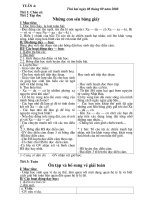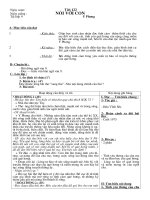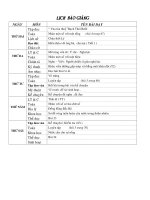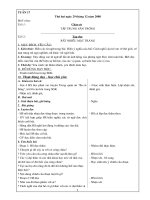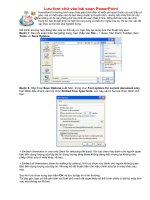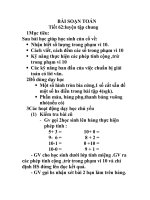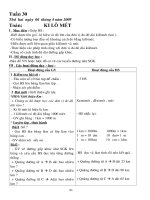Bài soạn Prefixes & Suffixes
Bạn đang xem bản rút gọn của tài liệu. Xem và tải ngay bản đầy đủ của tài liệu tại đây (557.89 KB, 61 trang )
Prefixes & Suffixes
Building Vocabulary Through Prefixes, Roots &
Suffixes
Introduction
re you looking for an element of English language study that is utilized in every aspect of
language usage? Are you frustrated that vocabulary building in textbooks is limited to
memorization of individual words? Would you like to systematize vocabulary building so that your
students can continue to learn vocabulary once they are out of your class? If this is the case with
you, I recommend the study of prefixes roots and suffixes. This is not a single class exercise, nor a
single lesson plan. It is an introduction to the most utilized word parts that, in their many
combinations, make up 50% of the English language. It requires perseverance, but is rewarded by
students who are grateful that they have become comfortable with the ability to recognize words
they are not immediately familiar with. And confidence with vocabulary goes a long way in
reading, writing, listening, speaking, and with standardized test-taking.
A
Purpose
nglish vocabulary is enormous and grows steadily with technological and cultural
assimilations. The vast majority of the new words introduced, and a great percentage of the
words used to express abstract ideas, are complex words that are made up of simple word parts
(prefixes, roots, and suffixes) that have their own definitions and, when familiar to the student of
English, can be understood in context without an exact definition. This is the foundation of the
system which I present to my students. By slowly and steadily studying the most prominent
prefixes, roots, and suffixes, students can acquire a vocabulary that is far greater than the sum of its
parts.
E
Necessities
he most crucial requirement in this system is a basic understanding of the most prominent
prefixes, roots and suffixes in the English language. There are many resources for obtaining
support information, on the Internet and in books, but below is a short list of some of the
predominant prefixes, roots and suffixes:
T
Prefixes Roots Suffixes
ab - away vis, vid - to see -tion, -ion, -sion - n. condition
ad - to, toward ject - push -al - adj., relating to
con, com, co - with, together press- press -e - makes a noun or verb
de - down, from cis, cid - cut, kill -ive - adj., relating to
ex, e - out of, from pend, pens - hang -able, -ible - able to, can
in, im - in or not fac, fici, fec - make, do -ia - n. condition, disorder
micro - small lat- carry -ly - adverb
mono - one mit, mis- send, do -ology -study
multi - many nav, naut - sail, boat -ary, -ory - place
ob - to, toward ten,tend,tain - hold
pre,pro - before, near ped, pod, pus - foot
re - back, again cept, ceiv - take
Page 1
Prefixes & Suffixes
rupt - break
he source I use is the dictionary The Structure of English Words, 4th ed., by Clarence Sloat and
Sharon Taylor, Kendall Hunt Publishing Company, 1996, ISBN 0-7872-2248-8. I have never
seen any book with a better collection of prefixes, roots and suffixes, as well as listings of the words
that each word part is used in. Another book worth looking into is English Words from Latin-Greek
Elements, by Donald Ayers and Thomas Worthen, University of Arizona Press, 1986. Check out
these websites for more truncated, but still effective, lists:
T
• www.ccps.org/ccps/pvms/Challenge/Vocabbuild.html
• www.lexfiles.info
• www.southampton.liunet.edu
Method
t does not matter if you are teaching a reading, writing, or listening/speaking class. It does not
matter what text is being used, or if there is any text at all. Any paragraph written in English will
have at least a few words that are made up of prefixes, roots and suffixes, and this is where the
method begins. This system should be introduced on the first day of class (to great
incomprehension, no doubt), and should be dealt with in no more than 10 or 15 minutes per class.
I
fter reading a paragraph, the teacher should excerpt a few complex words, for example
'invisible' and 'decision.' The teacher then tells the students that these words are made up from
word parts and that a great many words in English are as well, and that studying these parts increases
vocabulary immensely. The teacher breaks the words down into their parts, writing on the board
what each part means. Then, introduce other words that have the same roots in them, for 'vis,vid'
television, video, and even view, for 'cis, cid' scissors, homicide, and suicide. Then define the
prefixes and suffixes of those words. This will lead to a list of 8 or 10 words. This kind of
brainstorming should be kept to a minimum in the first weeks and then indulged in more freely as
the students gain in confidence. The students will be confused at first. Just remind them that this is
a process that gets easier with repetition. The next week, quiz the students on how to break down
last week's words into prefixes, roots and suffixes, and what each word part means. I usually chose
5 words and the quiz is worth 10 points, one point for identifying the correct prefix, root, and suffix,
and one point for correct definitions of each word part. (If the word is broken down incorrectly, for
example 'inv- in, -isi- to see, -ble- able to,' one point is taken off. If one part is defined incorrectly, '-
vis- to scare', one point is taken off.) After the quiz, or during the reading time in class, I introduce
half a dozen new words and word parts for the following week.
A
here are complications, for example 'in' in invisible become 'im' in impossible, and 'ob' in
obvious becomes 'op' in opposite. There are 'stem extenders' which mean nothing but help with
pronunciation, like '-ac-' in tenacity, which is a noun related to holding. But these exceptions
dwindle in significance as the presentation of new word parts and words and the repetition of
quizzes occurs over a period of weeks. In my classes, students' scores begin at the 2s and 3s, and
increase to 8s, 9s, and 10s over a few weeks.
T
Page 2
Prefixes & Suffixes
Conclusion
n a matter of weeks, students will not only be comfortable identifying complex words in their own
reading and writing, but also of breaking those words (and others with which they are not
familiar) down and attempting to understand their meaning by the meanings of their parts. They will
know the most popular prefixes and suffixes (ad-, de-, ex-, in-, and –tion, -ate, -al) because they will
have seen them and heard them repeated many times over. I reward students who utilize complex
words in their writing or speaking with extra credit points. This system is daunting at first, but over
time and with repetition, students naturally become more confident, and learn how to teach
themselves the language. Their growing confidence is easy to see in their increasing quiz scores. I
generally finish the term presenting the students with a list of the words that they have encountered –
students are astonished at just how many words they have seen and can handle. The ultimate reward
any ESL teacher can attain is to see the students learn a difficult task and apply their learning to their
everyday lives. To my mind, there is no aspect of language that is more important than vocabulary
building and comprehension. Using this system, I have been rewarded over and over again by
grateful students. With patience and perseverance, I am sure you will have the same experience.
I
Preparation for an American University Program
Vocabulary Workshop
Prefixes
refixes and suffixes were originally words themselves but they are now groups of letters added
to words or to roots to create new words. Prefixes [pre (before) + fix (fasten) = fasten before]
are groups of letters placed before words or roots. Prefixes modify or extend the meanings of words
and roots. Following is a list of commonly used prefixes and sample vocabulary.
P
INDEX: A B C D E I M N O P R S T U
Back to Vocabulary Workshop
Page 3
Prefixes & Suffixes
• a-, ac-, ad-, af-, ag-, al-, an-, ap-, as-, at- to, toward, near, in addition to
o aside (adverb): to or toward the side
a + side
o accompany (verb): to go with someone as a companion
ac + com + pan + y
o adjust (verb): to correct, to move closer to a correct position
ad + just
o affix (verb): to attach to something, to fasten
af + fix
o aggression (noun): hostile behavior towards someone or something
ag + gress + ion
o allocate (verb): to distribute to specific people or for specific purposes
al + loc + ate
o annihilate (verb): to destroy
an + nihil + ate
o associate (verb): to join with
as + soci + ate
o attend (verb): to look after, to go to
at + tend
• a-, an- not, without
o apolitical (adjective): without interest in politics
a + polit + ic + al
o anemia (noun): the condition (disease) of not having enough red blood cells
an + em + ia
• ab-, abs- away from, off
o abrupt (adjective): unexpected change
ab + rupt
o absolve (verb): to be set free from one's actions or obligations
ab + solve
• ante- before
o anterior (adjective): before or near the front
ante + rior
• anti- against
o antipathy (noun): dislike, opposite feeling
anti + path + y
• auto- self
o automotive (adjective): related to self-propelled machines
auto + mot + ive
Page 4
Prefixes & Suffixes
• bi- two
o biped (noun): a two-footed animal
bi + ped
o biennial (adjective): happening every two years bi + enni + al
• cat-, cata-, cath- down, with
o category (noun): a class or set to which a thing belongs
cate + gor + y
o catalogue (noun): a book or pamphlet that lists and describes
cata + log + ue
o catheter (noun): a medical device used to tranfer fluids cath +eter
• circum- around
o circumvent (verb): to manage to get around a situation
circum + vent
• co-, cog-, col-, com-, con-, cor together, with
o cohesiveness (noun): the ability to stick together
co + hes + ive + ness
o cognate (adjective): related, similar in nature
cog + nate
o collaborate (verb): to work together
col + lab + or + ate
o commitment (noun): to entrust, to put into a place
com + mit + ment
o convenient (adjective): handy, nearby
con + veni + ent
o correct (verb): to set right, to be right
cor + rect
• contra- against, opposite
o contradict (verb) to state the opposite
Page 5
Prefixes & Suffixes
contra + dict
• de- to do the opposite, to take away from
o decrease (verb): to grow smaller, to become less
de + cre + ase
• di-, dif-, dis- apart, separate, two, opposite, not
o divide (verb): to separate into two or more parts
di + vide
o differ (verb): to be unlike
dif + fer
• dis- not, opposite of, exclude
o distrust (verb): to have no confidence or trust
dis + trust
• e-, ex- out, out of, from
o emit (verb) to send out
e + mit
o expel (verb): to force out ex + pel
• en-, em- put into
o enamor (verb): to cause to love, to "put" someone "into" love
en + am + + or
o empower (verb): to give power, to put into power em + pow + er
• epi-, upon, beside, over
o epilogue (noun): the concluding section of a play or literary work
epi + logue
• extra- beyond
o extraordinary (adjective): going beyond normal
extra + ordin + ary
Page 6
Prefixes & Suffixes
• il-, im-, in-, ir, not, in
o illegible (adjective): cannot be read
il + leg + ible
o imposter (noun): someone who poses as someone else
im + post + er
o inaction (noun): lack of motion, idle
in + act + ion
o irresolute (adjective): uncertain about hot to act, undecided, not having a solution
ir + re + solute
• in-, im-, il- in, into
o instead (adverb): in place of, an alternative
in + stead
o import (verb): to bring into a country from another country
im + port
• inter- between, among
o interject (verb): to throw something (usually a comment) between other things
inter + ject
• intro- into
o introspection (noun): to look into one's own thoughts and feelings
intro + spect + ion
• mal- bad
o malfunction (noun): when something does not work properly
mal + funct + ion
• mis- wrong
o misconduct (noun): wrong doing, bad behavior
mis + con + duct
Page 7
Prefixes & Suffixes
• mono- one
o monologue (noun): a dramatic performance or speech given by one actor
mono + logue
• multi- many
o multiply (verb): to increase in number
multi + ply
• non- not, no
o nonsense (noun): something that has no meaning or makes no sense
non + sense
• ob-, oc-, of-, op- toward, against, in the way
o obtain (verb): to gain or get, to get a hold of
ob + tain
o occur (verb): to happen, to come to mind
oc + cur
o offer (verb): to attempt to give, to propose, to try to hand out
of + fer
o oppose (verb): to be against, to stand in the way of something
op + pose
• over- excessive, above
o overwork (verb): to have too much work
over + work
Page 8
Prefixes & Suffixes
• para- beside
o paradox (noun): a statement that seems true and contradictory at the same time
para + dox
• per- through
o persecute (verb): to go after, to pursue
per + secute
• post- after
o postpone (verb): to put off to a later time, to delay
post + pone
• pre- before
o precede (verb): to go before, to come in front of
pre + cede
• pro- for, foward
o propel (verb): to push forward
pro + pel
• re- back, again
o readmit (verb): to allow in again
re + ad + mit
• retro- backward
o retrospect (noun) to look back at past events
retro + spect
Page 9
Prefixes & Suffixes
• se- apart, move away from
o secede (verb): to withdraw from an organization
se + cede
• semi- half
o semiannual (adjective): occurring twice a year
semi + annu + al
• sub-, suc-, suf-, sup-, sur-, sus under, beneath, near, from below, secretly, above, up
o submarine (adjective): underwater
sub + mar + ine
o succeed (verb): to do well, to come after
suc + ceed
o suffice (verb): to be enough
suf + fice
o support (verb): to hold up, too keep up
sup + port
o survive (verb): to live, to live through something, to exist
sur + vive
o sustain (verb): to keep up, to hold up,
sus + tain
• super- over, above
o superimpose (verb): to place something on top of something else
super + im + pose
• syn-, sym- together, at the same time
o synchronous (adjective): happening at the same time
syn + chron + ous
o sympathy (noun): sharing another person's feelings, compassion
sym + path + y
• trans- across, beyond, change
o transform (verb): to change shape
Page 10
Prefixes & Suffixes
trans + form
• tri- three
o tripod (noun): a three-legged stand
tri + pod
• un- not, against, opposite
o unceasing (adjective): never ending, continuous
un + ceas + ing
• uni- one
o uniform (adjective): having the same form or consistancy
uni + form
SOME MORE EXPLANATIONS
prefix is placed at the beginning of a word to modify or change its meaning. This is a list of the most common
prefixes in English, together with their basic meaning and some examples. You can find more detail or
precision for each prefix in any good dictionary. The origins of words are extremely complicated. You should
use this list as a guide only, to help you understand possible meanings. But be very careful, because often what appears
to be a prefix is not a prefix at all. Note also that this list does not include elements like "auto-" or " bio-", because these
are "combining forms", not prefixes.
A
Prefix Meaning Examples
a- also an- not, without atheist, anaemic
a-
to, towards aside, aback
in the process of, in a
particular state
a-hunting, aglow
a-
of anew
completely abashed
ab- also abs- away, from abdicate, abstract
ad- also a-, ac-, af-, ag- movement to, change into, advance, adulterate, adjunct, ascend, affiliate, affirm,
Page 11
Prefixes & Suffixes
al-, an-, ap-, at- as-,
at-
addition or increase
aggravate, alleviate, annotate, apprehend, arrive, assemble,
attend
ante- before, preceding antecedent, ante-room
anti- also ant-
opposing, against, the
opposite
anti-aircraft, antibiotic, anticlimax, Antarctic
be-
all over, all around bespatter, beset
completely bewitch, bemuse
having, covered with bejewelled
affect with (added to nouns) befog
cause to be (added to
adjectives)
becalm
com-
also co-, col-, con-,
cor-
with, jointly, completely combat, codriver, collude, confide, corrode
contra- against, opposite contraceptive
counter-
opposition, opposite
direction
counter-attack, counteract
de-
down, away descend, despair, depend, deduct
completely denude, denigrate
removal, reversal de-ice, decamp
dia- also di- through, across diagonal
dis- also di-
negation, removal,
expulsion
disadvantage, dismount, disbud, disbar
en- also em-
put into or on engulf, enmesh
bring into the condition of enlighten, embitter
intensification entangle, enrage
ex- also e-, ef-
out exit, exclude, expand
upward exalt, extol
completely excruciate, exasperate
previous ex-wife
Page 12
Prefixes & Suffixes
extra- outside, beyond extracurricular
hemi- half hemisphere
hyper-
beyond, more than, more
than normal
hypersonic, hyperactive
hypo- under hypodermic, hypothermia
in-
also il-, im- not, without infertile, inappropriate, impossible
also il-, im-, ir- in, into, towards, inside influence, influx, imbibe
infra- below infrared, infrastructure
inter- between, among interact, interchange
intra- inside, within intramural, intravenous
non- absence, negation non-smoker, non-alcoholic
ob- also oc-, of-, op-
blocking, against,
concealing
obstruct, occult, offend, oppose
out-
surpassing, exceeding outperform
external, away from outbuilding, outboard
over-
excessively, completely overconfident, overburdened, overjoyed
upper, outer, over, above overcoat, overcast
peri- round, about perimeter
post- after in time or order postpone
pre-
before in time, place, order
or importance
pre-adolescent, prelude, precondition
pro-
favouring, in support of pro-African
acting for proconsul
motion forwards or away propulsion
before in time, place or
order
prologue
re- again repaint, reappraise, reawake
semi- half, partly semicircle, semi-conscious
Page 13
Prefixes & Suffixes
sub-
also suc-, suf-, sug-,
sup-, sur-, sus-
at a lower position submarine, subsoil
lower in rank sub-lieutenant
nearly, approximately sub-tropical
syn- also sym- in union, acting together synchronize, symmetry
trans-
across, beyond transnational, transatlantic
into a different state translate
ultra-
beyond ultraviolet, ultrasonic
extreme ultramicroscopic
un-
not unacceptable, unreal, unhappy, unmanned
reversal or cancellation of
action or state
unplug, unmask
under-
beneath, below underarm, undercarriage
lower in rank undersecretary
not enough underdeveloped
Suffixes
uffixes are groups of letters attached to the ends of roots, words, and word groups.
Suffixes serve a grammatical function. A suffix can indicate what part of speech (noun,
verb, adjective, adverb) to which the word belongs. Suffixes can also modify and
extend meaning. The following suffixes are grouped beneath the grammatical function they
perform.
S
NOUNS
Nouns perform the function of naming. Nouns name persons, places animals or things, as well as groups, ideas and
qualities. In a sentence, nouns can be subjects, objects, or appositives.
Page 14
Prefixes & Suffixes
INDEX: A D E F I M N O S U Y
• -acy, -cy
o Noun: state or quality
privacy: the state of being alone
priv + acy
infancy: the state of being a baby or young child
in + fan + cy
• -age
o Noun: activity, or result of action
courage : having the spirit to overcome fear
cour + age
• -al
o Noun: action, result of action
referral : the action of directing a person to another place, person or thing
re + ferr + al
• -an
o Noun: person
artisan : a craftsperson
arti + san
• -ance, -ence
o Noun: action, state, quality or process
resistance : the action of opposing something
re + sist + ance
independence: the state of not being under the control of others, free, self-governing
in + de + pend + ence
• -ancy, -ency
o Noun: state, quality or capacity
vacancy : an empty room or position
vac + ancy
agency: the capacity to exert power or influence, a position or person that performs a function
Page 15
Prefixes & Suffixes
ag + ency
• -ant, -ent
o Noun: an agent, something that performs the action
disinfectant : an agent that destroys germs, somthing that cleans
dis + in + fect + ant
dependent: a thing supported by another, a thing determined by another
de + pend + ent
• -ate
o Noun: state, office, fuction
candidate : a person nominated for an office or position
candid + ate
• -ation
o Noun: action, resulting state
specialization : the result of being distinguished by one quality or ability
spec + ial + iz + ation
• -dom
o Noun: place, state of being
wisdom : possessing knowledge
wis + dom
• -er, -or
o Noun: person or thing that does something
porter : a person who carries things
port + er
collector: a person who collects or gathers things
col + lect + or
Page 16
Prefixes & Suffixes
• -ful
o Noun: an amount or quanity that fills
mouthful : an amount that fills the mouth
mouth + ful
• -ian, an
o Noun: related to, one that is
pedestrian : a person who walks
ped + estr + ian
human: a person
hum + an
• -ia
o Noun: names, diseases
phobia : an illogical fear of something
phob + ia
• -iatry
o Noun: art of healing
psychiatry : branch of medicine that deals with the mind and emotions
psych + iatry
• -ic, ics
o Noun: related to the arts and sciences
arithmetic : a branch of math that usually deals with non-negative numbers
arithm + et + ic
economics: the social science related to studying business
eco + nom + ics
• -ice
o Noun: act
malice : the desire to do evil
mal + ice
Page 17
Prefixes & Suffixes
• -ing
o Noun: material made for, activity, result of an activity
flooring : a material made for floors
floor + ing
swimming: the activity of swimming or moving through water
swim(m) + ing
building: the result of making a structure
build + ing
• -ion
o Noun: condition or action
abduction : the action of carrying someone away by force
ab + duct + ion
• -ism
o Noun: doctrine, belief, action or conduct
formalism : a belief in sticking to prescribed forms or artistic styles
form + al + ism
• -ist
o Noun: person or member
podiatrist : a foot doctor
pod + iatr + ist
• -ite
o Noun: product or part
graphite : a black material used in making pencils
graph + ite
• -ity, ty
o Noun: state or quality
lucidity : clear thinking
luc + id + ity
novelty: something new or unusual
nov + el + ty
• -ive
o Noun: condition
native : a person born in a specific place
nat + ive
• -ment
o Noun: condition or result
Page 18
Prefixes & Suffixes
document : an official paper usually showinf proof or evidence of something
doc u + ment
• -ness
o Noun: state, condition, quality
kindness : the quality of being kind or nice
kind + ness
• -or
o Noun: condition or activity
valor : bravery, courage
val + or
• -ory
o Noun: place for, serves for
territory : an area around a place
territ + ory
• -ship
o Noun: status, condition
relationship : the state of being related or connected to something or someone
re + lat + ion + ship
Page 19
Prefixes & Suffixes
• -ure
o Noun: act, condition, process, function
exposure : the condition of being exposed or unprotected
pos + ure
• -y
o Noun: state, condition, result of an activity
society : companionship
soci + et + y
victory: the result of winning something
vict + or + y
VERBS
Verbs make statements about nouns, ask questions, give commands, or show states of being. Verbs can be active or
passive. Verbs also show tense or time of action.
INDEX: A E I U
• -ate
o Verb: cause to be
Page 20
Prefixes & Suffixes
graduate : to give a degree to, to pass from one stage to the next
grad u + ate
• -ed
o Verb: past tense
attained : something that has been reached or grasped
at + tain + ed
• -en
o Verb: to cause to become
moisten : to cause to become moist or damp
moist + en
• -er, -or
o Verb: action
ponder : to think about
pond + er
clamor: to make noise, to call for loudly
clam + or
• -ify
o Verb: cause
specify : to name or indicate in detail
spec + ify
• -ing
o Verb: present participle
depicting : showing, describing with images or pictures
de + pict + ing
• -ize
o Verb: cause
Page 21
Prefixes & Suffixes
fantasize : to dream about something, to create images in the mind
fant + as + ize
• -ure
o act
Verb: conjecture : to come to a conclusion by supposition or guesswork
con + ject + ure
Back to Vocabulary Workshop Home Page, vocabulary, prefixes, or suffixes.
ADJECTIVES
Adjectives describe or modify nouns. Adjectives tell the reader more about the noun used in the sentence.
INDEX: A E F I L O Y
• -able, -ible
o Adjective: worth, ability
solvable : able to be solved or explained
solv + able
incredible: not able to be believed, amazing
in + cred + ible
• -al, -ial, -ical
o Adjective: quality, relation
structural : related to the physical make up of a thing
struct + ure + al
territorial: related to nearby or local areas
territ + or + ial
categorical: related to a category, aboslute
Page 22
Prefixes & Suffixes
cate + gor + ical
• -ant, -ent, -ient
o Adjective: kind of agent, indication
important : marked by worth
im + port + ant
dependent: determined or relying upon something else
de + pend + ent
convenient: at hand, easy to use
con + ven + ient
• -ar, -ary
o Adjective: resembling, related to
spectacular : related to something that is eye-catching or amazing
spectac + ul + ar
unitary : related to units or single groups representing quantities
unit + ary
• -ate
o Adjective: kind of state
inviolate : not disturbed, pure
in + viol + ate
• -ed
o Adjective: having the quality of
terraced : having terraces or steps
terra c + ed
• -en
o Adjective: material
silken : made from silk, a fiber produced by worms
silk + en
• -er
o Adjective: comparative
brighter : more light
bright + er
• -est
o Adjective: superlative
strongest : having the most strength
strong + est
Page 23
Prefixes & Suffixes
• -ful
o Adjective: having, giving, marked by
fanciful : marked by imagination
fanc i + ful
• -ic
o Adjective: quality, relation
generic : related to a whole group
gener + ic
• -ile
o Adjective: having the qualities of
projectile : something thrown with an outside force
pro + ject + ile
• -ing
o Adjective: activity
cohering : the act of sticking together
co + her + ing
• -ish
o Adjective: having the character of
newish : modern, recent
new + ish
• -ive, -ative, -itive
o Adjective: having the quality of
festive : having the quality of a festival or party
fest + ive
cooperative : being able or willing to work with another person or thing
co + oper + ative
Page 24
Prefixes & Suffixes
sensitive: easily felt, responsive to the senses
sens + itive
• -less
o Adjective: without, missing
motiveless : a reason for someone to do something
mot + ive + less
• -ous, -eous, -ose, -ious
o Adjective: having the quality of, relating to
adventurous : charcterized by the desire to seek new experiences or risks
ad + vent + ur + ous
courageous : characterized by courage, brave
cour + ag + eous
verbose: having more words than needed
verb + ose
fractious: characterized by being difficult or troublesome
fract + ious
• -y
o Adjective: marked by, having
hungry : having hunger, marked by a desire
hungr + y
Page 25

